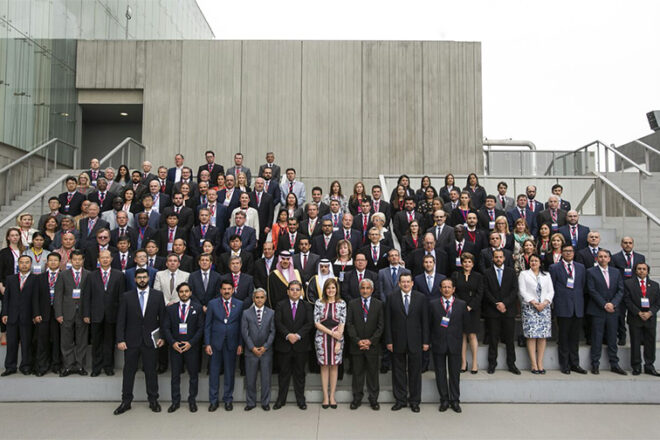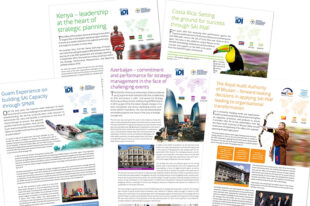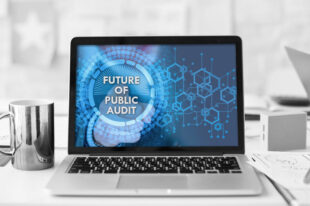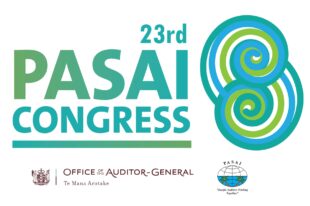INTOSAI Celebrates Lima Declaration 40th Anniversary

Nearly 150 members of the International Organization of Supreme Audit Institutions (INTOSAI), an organization dedicated to performing public external audit, gathered in Lima, Peru, to celebrate the 40th anniversary of the Lima Declaration in December 2017.
The Lima Declaration, approved during the ninth INTOSAI Congress in 1977, is considered the magna carta of government auditing and defines the characteristics and requirements for Supreme Audit Institution (SAI) independence and effective functioning. Forty years later, the Lima Declaration maintains its validity, and its eight fundamental principles have been recognized by the United Nations General Assembly in two of its resolutions.
The event featured a personal chronicle from Dr. Hubert Weber, the only person in attendance at the 40th commemoration who was also present at the declaration’s adoption in 1977. Dr. Weber, former President of the European Court of Auditors, took participants on a journey describing the declaration’s inception.
The agenda also included several presentations and panel discussions on SAI independence, its importance, continued relevancy and sustainability.
Highlights included findings and the action plan on the Peer Review Project on SAI Independence, a 2-year endeavor carried out by the INTOSAI General Secretariat in cooperation with the Austrian Court of Audit (ACA) and the Austrian Development Agency (ADA) in seven participating SAIs—Albania, Bhutan, Ecuador, Ethiopia, Trinidad and Tobago, Tunisia, and Vanuatu—from all regions of INTOSAI.
The project aimed to enhance transparency and accountability of public finances in the selected countries and create good examples of how independence is a crucial characteristic for good governance, transparency, accountability and credibility.
Mr. Hannes Loimer, ACA, stressed within the frame of the Action Plan that “cultivating cooperation with legislature and regularly developing and publishing reports are actions that can be taken toward achieving a stronger voice and independence.”
INTOSAI goal chair representatives provided perspectives on the relationship between the Lima Declaration and the INTOSAI strategic goals, citing ongoing efforts, initiatives and standards that support the Lima Declaration’s foundation and original principles.
“We should build bridges, not walls!” exclaimed Minister Augusto Nardes, SAI Brazil (Professional Standards Committee chair), who discussed the Lima Declaration as the anchor for all International Standards of Supreme Audit Institutions (ISSAIs). Minister Nardes championed the notion of working collaboratively.
Cultivating independence, as well as ensuring its continuance, does require work.
“Independence is a privilege. We need to work hard to get it. We need to work hard to maintain it,” noted Mr. Jan van Schalkwyk, SAI South Africa (Capacity Building Committee chair).
Mr. van Schalkwyk recognized that independence enables relevance, but it also obliges accountability. Leading by example is an important factor.
“Show that you are worthy of independence. Put into place long-term strategies to build institutional capacity, professionally qualified staff, professional standards and quality assurance,” he said.
Dr. Hussam Alangari, President, General Auditing Bureau, Saudi Arabia (Policy, Finance and Administration Committee chair) echoed the sentiment of implementing initiatives designed to help achieve independence and outlined the wide variety of mechanisms the PFAC supports that empower SAIs.
Though much progress has been made since the Lima Declaration’s establishment, challenges still exist, and several participants presented findings and insight, as the fight in favor of independence remains valid today according to 2017 INTOSAI Development Initiative (IDI) surveys.
Mr. Einar Gørrissen, IDI Director General, touched on the many obstacles SAIs experience to obtain and maintain independence, including publication restrictions, legal protection of SAI heads from removal, and increasing executive interference in the SAI budget process.
Global efforts to defend SAI interests are a must, and it is crucial to find effective solutions that address common challenges in a collective way.
Ms. Petra Schirnhofer, Austrian Development Agency advisor, remarked on the need to raise awareness about the tremendous importance SAI independence plays in a country’s progress and noted that listening, balancing interfering while addressing the issues, and being supportive of the SAI’s struggle for more independence are paramount.
“Governments must gain the trust of citizens every day,” stressed Mr. Juan M. Portal, Auditor General of SAI Mexico and Chairman of the Organization of Latin American and Caribbean Supreme Audit Institutions (OLACEFS).
Mr. Portal reminded participants of the permanent risks and external interferences that continue to threaten SAI independence, including corruption.
He furthered that independence is a necessity, and SAIs must be able to provide unbiased information regarding governmental management—not only to establish credibility but to truly provide value and benefits to citizens.
Mr. Nelson Shack Yalta, Comptroller General of the Republic of Peru, affirmed the need to be more involved with citizens and underscored the work of INTOSAI and SAIs on a global scale paying particular attending to SAI independence which is “crucial to ensure good governance, transparency and accountability in each country.”
Though the Lima Declaration was established 40 years ago, its relevancy lives on.
“The Lima Declaration is a timeless treasure,” expressed Mr. Rajiv Mehrishi, Comptroller and Auditor General of India, and he asserted, “SAIs must continue to evolve into even more accountable institutions.”





